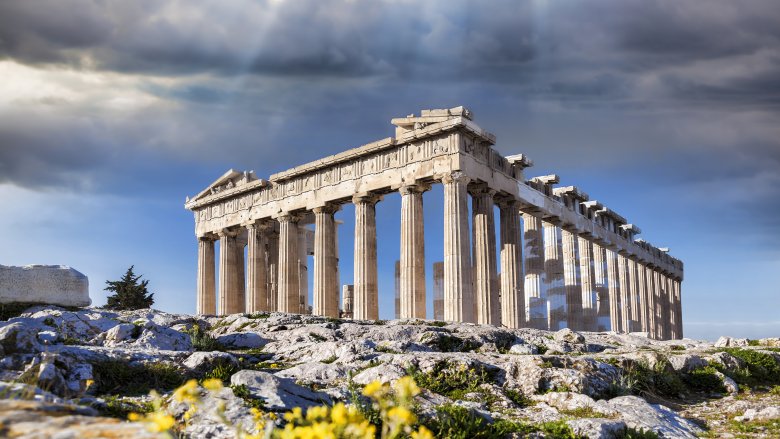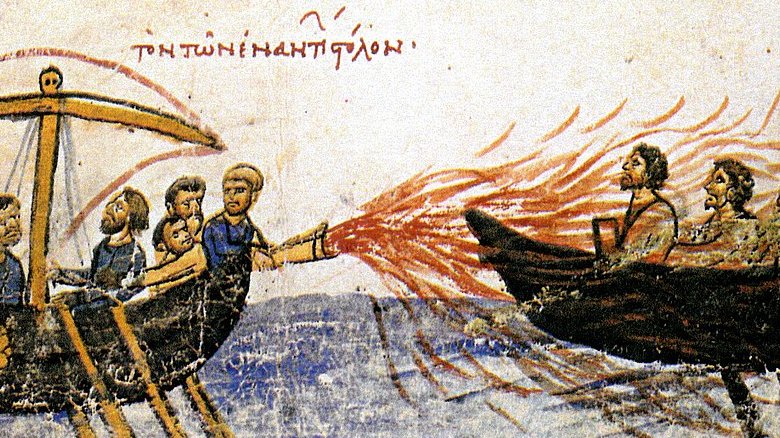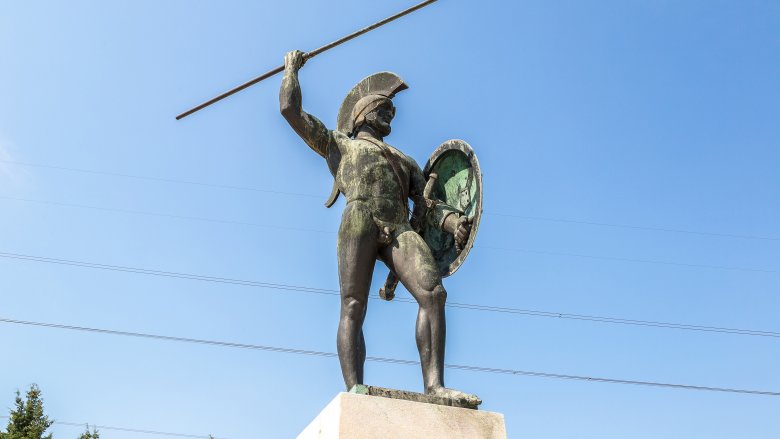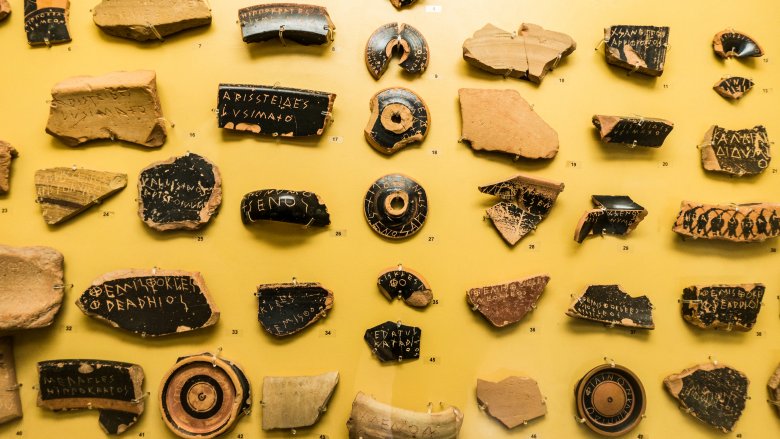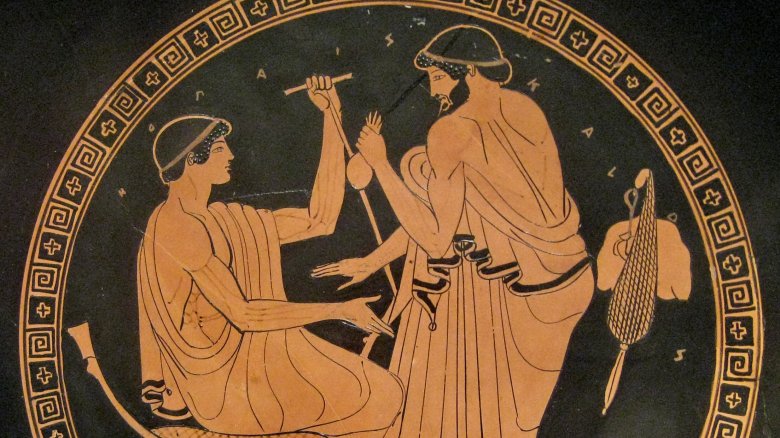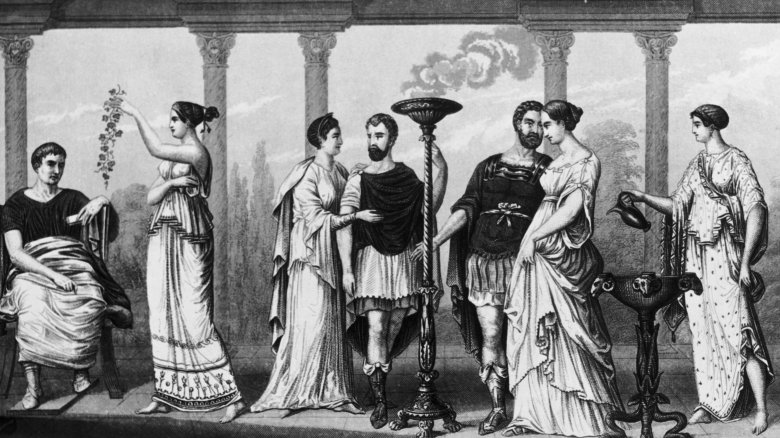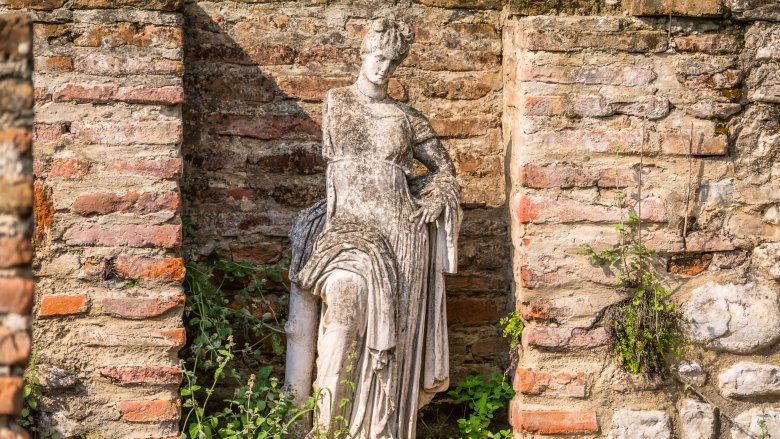Messed Up Things In Ancient Greece
Ancient Greece is often remembered by the modern collective consciousness as a civilization driven by enlightenment. To many, the Greeks' world was a progressive, democratic, and peaceful world, populated by philosopher-kings, teachers, athletes, artists, and priests. It was a society ahead of its time, united by faith, and occasionally divided by war. It was the cradle of Western civilization, the birthplace of storytelling, of thinking, of science, and of governance. And, in many ways, there's a lot of truth to all that.
But no society is perfect. It's impossible to hold those who lived thousands of years ago to today's standards of morals and ethics — and even by the standards of the ancients, every world is going to be afflicted by its fair share of depravity. The Ancient Greeks could be cruel, underhanded, and relentless in their pursuit of Aegean domination. Remember this: Just because they gave us geometry doesn't mean they wouldn't mess you up at the drop of a hat. You've been warned.
The development of early chemical weapons
Chemical warfare is usually associated more with contemporary conflicts than with ancient wars — the trenches in France, for example, the jungles of 'Nam or even, more recently, the ruined villages scattered across Syria and Iraq. As a method of dealing death and destruction, however, chemical warfare has existed for millennia. While the Greeks may not have quite invented it (that accolade likely belongs to the hunter-gatherer San society, who would poison the tips of their arrows before battle), they certainly contributed.
The earliest known use of a chemical incendiary weapon, for example, comes from the siege of Plataea in 429 B.C., when Spartan soldiers ignited a woodpile outside the city with sulphur, releasing sulphur dioxide gas into the air and forcing the Plataeans to flee their positions. Certain accounts also mention that the Spartans poisoned the water supplies of Athenian cities during the Peloponnesian War, an idea they likely gathered from the Scythians who had taken the city of Cirrha a few hundred years earlier using a similar method.
Most famous of all, however, is Greek fire, a (likely) petroleum-based substance invented by the Byzantine Greeks in the seventh century that couldn't be extinguished with water and would be fired from tubes fixed to the prows of Greek ships. Smells like victory. We still haven't figured out how to replicate it today.
Democracy with a grim twist
The Ancient Greeks are often praised for their adoption of democracy as a method of government — and rightly so, too. The truth is, though, that even a system as revered as democracy could find itself utilized for more nefarious purposes. There is no better illustration of this than the Mytilenian Debate of 427 B.C.
During the Peloponnesian War, the city-state of Mytilene had attempted to free itself from the influence of the Athenian Empire. Their revolt failed, however, and the Mytilenians were forced to submit once more to Athens. It was then up to the Athenians to decide what punitive measures to take. According to Thucydides, it was "in the fury of the moment" that they decided to execute not only the prisoners they'd taken to Athens but also the entire adult male population of Mitylene. The women and children, naturally, would be taken into slavery.
A ship was dispatched to Mytilene to carry out the order. Soon after this, the Athenians began to worry that their decision to pretty much burn an entire city to the ground may have been taken somewhat in haste, and issued another debate on the subject. A new vote was taken and it was decided that only the "prime movers" in the rebellion (around a thousand people) would be killed. A second ship was sent off to catch the first and reached them at Mytilene itself — just before the sentence was carried out. Democracy: pros and cons, really.
Roasted in the brazen bull
While the Greeks may not have been quite so torture-happy as the civilizations that would succeed them, tales from antiquity contain plenty of the macabre. Most famous of these is the brazen bull. The story is told by the Roman orator Cicero and a Sicilian historian known as Diodorus. According to them, the tyrant ruler Phalaris ordered the creation of a large, bronze structure in the shape of a bull. A door was placed in the bull's side, through which the victim would be placed. The door would be shut and a fire then lit beneath the bull itself. The victim, essentially, would be roasted alive.
The exact historical details of the story (which appears to have been common knowledge by the time Cicero and Diodorus came along) aren't certain, but many instances like this tend to have at least some grain of truth to them. And while the Greeks arguably weren't as bloodthirsty as, say, the Romans, the tale of Phalaris and the bull is a decent case for Greece's worst rulers being easily as vicious and sociopathic as Rome's.
Executions and forced suicides
The standard form of execution in Athens was bloodless crucifixion. The victim would be fastened to a board by the wrists and ankles, and a collar around the neck would be tightened gradually to strangle them to death. Occasionally, if the execution were to take place on the battlefield, the victim would be beheaded with a sword. (No longer bloodlessly, of course.) It was also possible to swap out your method of execution and instead ask to use hemlock to poison yourself. This, however, was an option only available to the wealthy, since a sufficiently potent dose of hemlock was anything but cheap.
If you managed to escape execution altogether, you could expect to be exiled and forced to begin again in another city or state. And while your transgression might be forgiven after death or exile, it certainly would not be forgotten. Political crimes in particular, such as treason, impiety, and temple robbery, were memorialized via inscription to make sure the knowledge of your crime would endure throughout the ages.
A Spartan childhood
Childhood was no cakewalk anywhere in Greece during ancient times, but perhaps no one had it quite as tough as the Spartans. The Spartan ethos was based on the notion, first written into law by the city-state's founder Lycurgus, that they were to be fearless, ruthless, and disciplined above all else.
A Spartan boy would be raised by his father until the age of 7, at which point he would head off to a state-run military camp and stay until he turned 30. They were taught to subsist on a paltry diet, trained relentlessly to perfect the art of combat and learned only basic versions of the subjects other Greek children were taught, such as music and mathematics. Often, they were forced to steal to survive, and it wasn't unknown for deaths to occur during training. Spartan girls, unlike elsewhere in Greece, were also provided a public education, but it was mainly meant to keep the Sparta train rolling. They would exercise outdoors and take part in athletics competitions, preparing their bodies to bear strong, healthy children.
Machinations of the ostracizers
Ostracism was a unique aspect of political life in Athens. The concept is a simple one: the Athenians could call a vote every year to assess the performance of their politicians. If someone was perceived to be a threat to the democratic principles upon which Athens stood, this would be made clear in the vote. A few months later, the assembly would meet again. Each citizen would vote for who should be ostracized by scrawling the name of their choice onto a piece of broken pottery. The man who garnered the most votes would be exiled from Athens for 10 years.
Unfortunately, this system — sorely lacking in modern politics — was open to abuse. A sly enough politician would be entirely capable of using an ostracism vote as a weapon to eliminate a difficult rival — just so long as that rival was in a weaker position. In 417 B.C. two politicians named Alcibiades and Nikias even ganged up to remove their third competitor, Hyperbolos. So you could be forced from your home for a decade simply because you were politically outmaneuvered. Luckily, the Athenians soon realized this, and ostracism was ended.
Ritualistic pedophilia
Pederasty was, quite famously, not only acceptable to the Ancient Greeks, but actively encouraged and celebrated. It originated with the Cretans, who implemented this form of pedophilia via an act of ritual kidnapping in which a boy would be "taken" (with the boy's father's permission) by another adult male. They would head out into the wilderness, hunting, feasting, and doing adult things. They would then return back to their home city with the boy as a "comrade" of the man, living with him. The boy could then either continue his relationship with the man or denounce him for any misbehaviors that had occurred during their time together — which might well be the barest minimum punishment for sexual abuse to have ever existed in human history.
Although it seemed to have originated in Crete, similar practices existed across the Greek world — including Athens, Sparta, and Thebes — and are depicted frequently in art and literature from the period.
State, property and unity over women
Pedophilia wasn't the only ghoulish facet of the Greeks' sexual ideology, however. They also held a firm belief that adultery was an unquestionably worse act than rape. Rape wasn't so much a matter of violence against a human to the Greeks, so much as it was violence against property — that is, the property of the woman's father or husband. A rapist would therefore be punished with a fine. Adultery, however, was thought to have a devastating impact on the family unit, a vital institution in Ancient Greece. Adulterers could be killed on the spot if caught in the act, and the wife was immediately and legally divorced, too.
The result of this strange dichotomy is that the woman's well-being was perceived as being far less important than the stability of the family, which is basically synonymous with the stability of society. This itself is a consequence of the Ancient Greeks' attitudes toward women in general — which, frankly, were anything but kind.
Oppressing the parasitic, deformed males
Likely as a result of the tale of Pandora's Box, a distrust of women was embedded in the Ancient Greek collective psyche pretty much from the start. According to gender classicist Jorunn Økland, women were viewed as an "irresistibly beautiful but parasitic and lazy artifact that sits in the house of the man and eats everything." Not only this, but Aristotle believed and insisted that women were deformed males, created after something went wrong in their mothers' wombs. Plato even warned men not to turn into women when they were reincarnated — best done by finding success in their incumbent lives.
These beliefs translated across to the realities of civic life. Women were unable to vote, own land, or inherit property. Female babies were often abandoned at birth and girls' education was focused more on preparation for child-rearing than for intellectual stimulation. They, like boys, were also subjected to pederasty. When they married — usually at the age of 13 or 14 — they became the property of their husbands.
The ultimate taboo
There is some contention among classicists as to whether the Ancient Greeks performed the act of human sacrifice. In 2016, skeletal remains of a teenager were discovered on Mount Lykaion which appeared to have been a product of a ritual sacrifice (likely to Zeus). Previous studies on the subject had concluded that the Greeks likely didn't offer humans to their gods — and some academics remained skeptical even in the face of the discovery.
Classical accounts of human sacrifices, however, do exist. Mount Lykaion itself has been linked in ancient literary sources with the sacrifice of young boys and animals, which is consistent with the remains archaeologists found on the mountain. Ritualistic murder has also been depicted in ancient texts in 480 B.C. by Themistocles, by the Trojans against Locrin girls, and against human scapegoats known as pharmakoi in the major Greek cities. Definitive proof of this grim practice may be difficult to come by, but enough dots certainly exist to be worth connecting.
